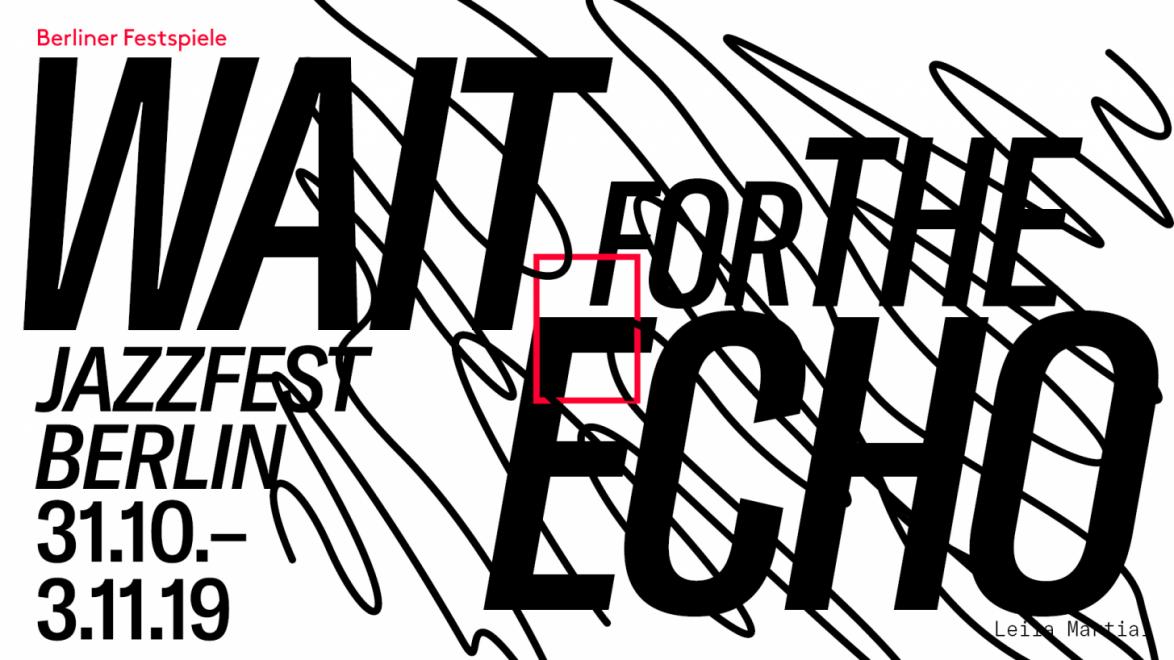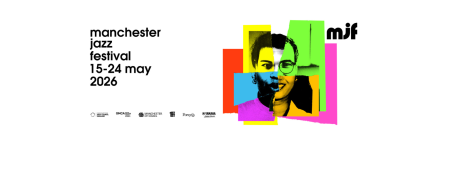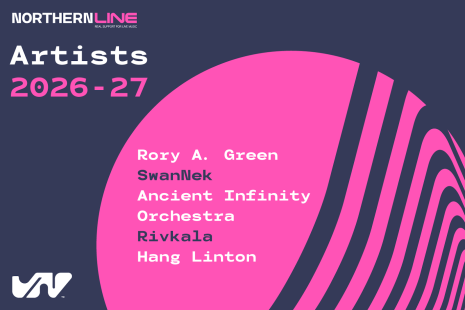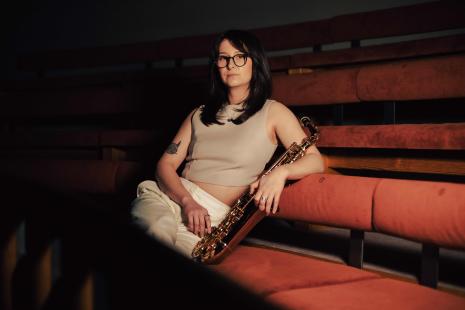

Ever since a group of African-American avantgarde musicians – including Anthony Braxton – came together in Chicago in the 1960s to form the Association for the Advancement of Creative Musicians, such individuals have repeatedly organised themselves in collectives that shape the production conditions and performance practice of their own music and support the freedom of creative autonomy against the pressure of exploitative systems.
With its focus on communities, collectives and international encounters and also on improvisation as a culture and language within such communities, Jazzfest Berlin 2019 draws on established partnerships while at the same time extending invitations to many new voices that are being presented in Germany for the first time.
One representative of this practice of building bridges and facilitating encounters is the American composer, multi-instrumentalist, teacher and visionary Anthony Braxton, whose work is a main focus of this year’s Jazzfest Berlin. The festival opens on Thursday evening with only the third ever performance worldwide of his large scale project “Sonic Genome” at the Gropius Bau: 14 musicians from among Braxton’s closest collaborators, 39 musicians from Berlin’s diverse music scene and six members of the Australian Art Orchestra will take part in this transatlantic co-production. In addition to this, a programme of discussions will explore selected aspects from Anthony Braxton’s ongoing work that has lasted over five decades and inspired several generations of musicians. Braxton will then also close the festival on Sunday evening with a taster of his latest compositional system “ZIM Music”.
Two Late Night Labs emphasise the process-orientated nature of this approach to music. This new experimental format provides a platform for interdisciplinary collaboration in real time, presenting three intensely groove-oriented European trios on Friday featuring Anja Lauvdal, Petter Eldh and Lukas König. The musicians will play for 100 minutes in ever-changing formations on the reconfigured main stage of the Festspielhaus. Then on Saturday night under the joint leadership of the American trumpeter Rob Mazurek and the French guitarist Julien Desprez, who both played at last year’s festival, an expanded version of the international line-up T(r)opic will perform – along with dancers and musicians from the established groups São Paulo Underground and COCO, including renowned improvisation artists such as Mette Rasmussen, Susana Santos Silva, Guilherme Granado and Lotte Anker. In both of these labs the performers will repeatedly form new sub-groupings, passing through already existing independent ensemble configurations as well as entirely new combinations.
Another partnership that will be continued from last year is with KIM Collective – with the focus shifting to the Berlin music scene. At this year’s festival, the collective invites us to join them first for two nights in the Festspielhaus foyer in the interactive “Garden of Hyphae” before presenting the multimedia “Fungus Opera” on the main stage on Sunday night. One member of KIM Collective is the guitarist Julia Reidy. A new commisioned work from this Berlin-based artist will be performed on Friday night by the Australian Art Orchestra together with compositions by Peter Knight. For many years, the Australian Art Orchestra has worked on highly detailed adaptations of music from a wide range of periods and cultures that include the music of the indigenous Australian Yolngu tribe. Also on Friday night, Berlin percussionist Christian Lillinger performs his project “Open Form for Society”: a symphony of beats, keyboard patterns and strings that meets the improvising creativity of his ensemble. And the Berlinbased Turkish vocalist Cansu Tanrıkulu celebrates a world premiere with her new trio Melez and a “Suite” that transcends genre borders.
Other singers who will explore the spectrum of vocal expression at Jazzfest Berlin 2019 include the multi-instrumentalist Angel Bat Dawid from Chicago, who will pick up on themes from last year’s festival – Afrofuturism and Chicago’s role as a musical centre – along with her band The Brothahood, the vocalist and kantele player Sinikka Langeland, who will re-imagine traditional Finnish folk runes in thoroughly contemporary fashion in the Kaiser Wilhelm Memorial Church, and Leïla Martial. In a concert at Quasimodo, the latter will send her arsenal of often wordless vocal expression into a magical journey to a land where genre doesn’t exist.
Hip hop has also provided some of the musicians in this year’s festival with the inspiration to cross genre boundaries. The Young Mothers, for example, couple rap and heavy beats with funk, punk rock and free jazz in a wild but compelling mix of styles. James Brandon Lewis and his UnRuly Quintet embrace the rhythmic prerogatives of hip hop from the early 90s, whereas Ambrose Akinmusire finds common denominators between jazz and hip hop not only in their musical affinities but also their political content. In the German premiere of his new album “Origami Harvest” rap lyrics denouncing present-day racism meet sensitive arrangements for jazz combo and string quartet.
In addition, four new voices will offer proof of their impressive talents with solo performances this year: the pianists Eve Risser, Brian Marsella and Elliot Galvin, and the guitarist Miles Okazaki.
Be there for this four day festival when around 200 musicians from 15 different countries celebrate jazz – with all its awkwardness and contrariness, its freedom and its diversity, ranging from rebellion to beauty and from spirituality to virtuosity.
With its focus on communities, collectives and international encounters and also on improvisation as a culture and language within such communities, Jazzfest Berlin 2019 draws on established partnerships while at the same time extending invitations to many new voices that are being presented in Germany for the first time.
One representative of this practice of building bridges and facilitating encounters is the American composer, multi-instrumentalist, teacher and visionary Anthony Braxton, whose work is a main focus of this year’s Jazzfest Berlin. The festival opens on Thursday evening with only the third ever performance worldwide of his large scale project “Sonic Genome” at the Gropius Bau: 14 musicians from among Braxton’s closest collaborators, 39 musicians from Berlin’s diverse music scene and six members of the Australian Art Orchestra will take part in this transatlantic co-production. In addition to this, a programme of discussions will explore selected aspects from Anthony Braxton’s ongoing work that has lasted over five decades and inspired several generations of musicians. Braxton will then also close the festival on Sunday evening with a taster of his latest compositional system “ZIM Music”.
Two Late Night Labs emphasise the process-orientated nature of this approach to music. This new experimental format provides a platform for interdisciplinary collaboration in real time, presenting three intensely groove-oriented European trios on Friday featuring Anja Lauvdal, Petter Eldh and Lukas König. The musicians will play for 100 minutes in ever-changing formations on the reconfigured main stage of the Festspielhaus. Then on Saturday night under the joint leadership of the American trumpeter Rob Mazurek and the French guitarist Julien Desprez, who both played at last year’s festival, an expanded version of the international line-up T(r)opic will perform – along with dancers and musicians from the established groups São Paulo Underground and COCO, including renowned improvisation artists such as Mette Rasmussen, Susana Santos Silva, Guilherme Granado and Lotte Anker. In both of these labs the performers will repeatedly form new sub-groupings, passing through already existing independent ensemble configurations as well as entirely new combinations.
Another partnership that will be continued from last year is with KIM Collective – with the focus shifting to the Berlin music scene. At this year’s festival, the collective invites us to join them first for two nights in the Festspielhaus foyer in the interactive “Garden of Hyphae” before presenting the multimedia “Fungus Opera” on the main stage on Sunday night. One member of KIM Collective is the guitarist Julia Reidy. A new commisioned work from this Berlin-based artist will be performed on Friday night by the Australian Art Orchestra together with compositions by Peter Knight. For many years, the Australian Art Orchestra has worked on highly detailed adaptations of music from a wide range of periods and cultures that include the music of the indigenous Australian Yolngu tribe. Also on Friday night, Berlin percussionist Christian Lillinger performs his project “Open Form for Society”: a symphony of beats, keyboard patterns and strings that meets the improvising creativity of his ensemble. And the Berlinbased Turkish vocalist Cansu Tanrıkulu celebrates a world premiere with her new trio Melez and a “Suite” that transcends genre borders.
Other singers who will explore the spectrum of vocal expression at Jazzfest Berlin 2019 include the multi-instrumentalist Angel Bat Dawid from Chicago, who will pick up on themes from last year’s festival – Afrofuturism and Chicago’s role as a musical centre – along with her band The Brothahood, the vocalist and kantele player Sinikka Langeland, who will re-imagine traditional Finnish folk runes in thoroughly contemporary fashion in the Kaiser Wilhelm Memorial Church, and Leïla Martial. In a concert at Quasimodo, the latter will send her arsenal of often wordless vocal expression into a magical journey to a land where genre doesn’t exist.
Hip hop has also provided some of the musicians in this year’s festival with the inspiration to cross genre boundaries. The Young Mothers, for example, couple rap and heavy beats with funk, punk rock and free jazz in a wild but compelling mix of styles. James Brandon Lewis and his UnRuly Quintet embrace the rhythmic prerogatives of hip hop from the early 90s, whereas Ambrose Akinmusire finds common denominators between jazz and hip hop not only in their musical affinities but also their political content. In the German premiere of his new album “Origami Harvest” rap lyrics denouncing present-day racism meet sensitive arrangements for jazz combo and string quartet.
In addition, four new voices will offer proof of their impressive talents with solo performances this year: the pianists Eve Risser, Brian Marsella and Elliot Galvin, and the guitarist Miles Okazaki.
Be there for this four day festival when around 200 musicians from 15 different countries celebrate jazz – with all its awkwardness and contrariness, its freedom and its diversity, ranging from rebellion to beauty and from spirituality to virtuosity.



